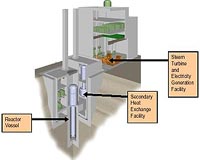 |
Tehran (AFP) Oct 25, 2009 Iran will allow a team of UN inspectors access to its controversial second uranium enrichment plant on Sunday to check whether the newly disclosed facility was created for peaceful nuclear purposes. Inspection of the plant, being built inside a mountain near the Shiite holy city of Qom, comes as US President Barack Obama garnered support from France and Russia for a separate UN-brokered deal to end the crisis over Tehran's atomic programme. A four-member team of International Atomic Energy Agency (IAEA) inspectors arrived in Tehran early on Sunday to inspect the facility which is being constructed adjacent to a military base south of the capital. It is not yet known if the team has already entered the plant. Iran's disclosure to the IAEA of the Qom plant's existence on September 21 sparked a wave of global outrage, with Obama warning the Islamic republic would face "increased pressure" if it fails to come clean on its atomic ambitions. Iran has already been enriching uranium -- the most controversial aspect of its nuclear project -- for several years at another plant in the central city of Natanz, in defiance of three sets of UN sanctions. Uranium enrichment is the focus of Western concern that Iran's ultimate aim is to manufacture a nuclear weapon, a charge strongly denied by Tehran. Enriched uranium produces fuel for civilian reactors, but in highly extended form can also make the fissile core of an atomic bomb. IAEA chief Mohamed ElBaradei has already criticised Iran for what he said was its late disclosure of the Qom facility's existence, saying such construction must be revealed on the day it begins. Iran, which informed the agency about a year after building began, said its disclosure obligation only began 180 days before it placed any nuclear material inside the facility. Mohammad Kosari, deputy head of parliament's committee on national security and foreign policy, said the inspectors would visit only the Qom plant. "If they act within the framework of the law and the NPT (Non-Proliferation Treaty) we have no problem, but if they want to go beyond that it is up to us to decide," he said, indicating that any additional inspection requests would have to be cleared by Tehran. On Saturday, Mehr news agency, quoting an unnamed Vienna-based official, said the IAEA inspectors would "compare the information given by Iran (about the Qom plant) with the facility during their three-day visit." Lawmaker Hossein Ebrahimi said the IAEA inspection "shows that Iranian nuclear activities are peaceful and transparent." Officials say that at the Qom plant they intend to install new generation centrifuges -- the devices which enrich uranium at supersonic speed. The inspection comes as Obama, Russia's Dmitry Medvedev and France's Nicolas Sarkozy pledged support for a separate deal to end the crisis over Iran's uranium enrichment drive. The White House said the three "affirmed their full support" for a UN-brokered deal under which Tehran's existing stock of low-enriched uranium (LEU) would be sent abroad. Western powers are concerned that the material, if not shipped out, could be further enriched inside Iran to weapons grade. France has said the deal calls on Iran to transfer 1,200 kilos of LEU from its Natanz plant to Russia by the end of 2009. Russia would then enrich the material to the higher 19.75 percent needed as fuel for a Tehran research reactor which makes radio-isotopes for medical use. Diplomats say Moscow would sub-contract to France the process of turning this Russian-enriched uranium into fuel rods for the reactor. Obama is said to be cementing the positions of Russia and France, two key members of the group which has been negotiating with Iran. The group has often seemed at odds about the need for new sanctions. The three presidents spoke after Tehran ignored a Friday deadline to respond to the deal, saying it would make its decision in the next week. But on Sunday criticism continued inside Iran to the deal, which was originally proposed by President Mahmoud Ahmadinejad himself. Abolfazl Zohrevand, a senior Iranian atomic expert and diplomat, said Western powers want to ship the bulk of Iran's LEU abroad so it would have to ultimately "suspend" its uranium enrichment drive. Lawmaker Heshmatollah Felahatpishe said Tehran "must not participate in this dangerous game" with the West, the official IRNA news agency reported. Share This Article With Planet Earth
Related Links Nuclear Power News - Nuclear Science, Nuclear Technology Powering The World in the 21st Century at Energy-Daily.com
 Japanese firms to develop small nuclear reactors: report
Japanese firms to develop small nuclear reactors: reportTokyo (AFP) Oct 24, 2009 Japan's major nuclear reactor manufacturers have begun developing small nuclear power systems for both developed and emerging countries, a report said on Saturday. Toshiba Corp. is developing an ultra-compact reactor with an output of about 10,000 kilowatts and has started procedures for approval in the United States, the Nikkei business daily said. The new reactor, the Toshiba 4S, is ... read more |
|
| The content herein, unless otherwise known to be public domain, are Copyright 1995-2009 - SpaceDaily. AFP and UPI Wire Stories are copyright Agence France-Presse and United Press International. ESA Portal Reports are copyright European Space Agency. All NASA sourced material is public domain. Additional copyrights may apply in whole or part to other bona fide parties. Advertising does not imply endorsement,agreement or approval of any opinions, statements or information provided by SpaceDaily on any Web page published or hosted by SpaceDaily. Privacy Statement |